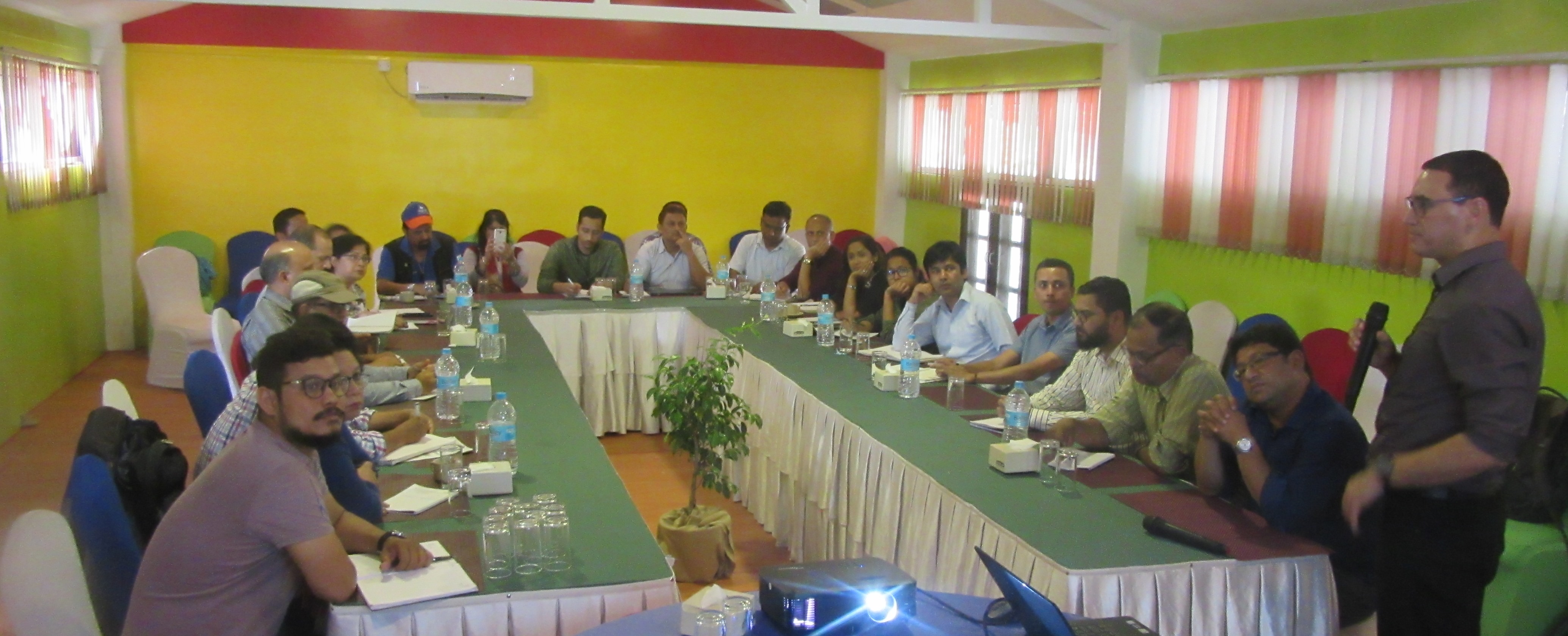
Interaction program on ‘Climate Finance in National Budget of Nepal.’

An interaction programme on Climate Finance in National Budget (2075/76) was organized on July 30, 2018 by Prakriti Resources Center. In the programme, Prabin Man Singh from PRC made a brief synopsis of the national budget of 2075/76 and analyzed allocation of climate budget across sectors and ministries. Sunil Acharya from Practical Action Nepal presented Action for Climate Today (ACT) works and learning on fostering accountability and transparency in climate finance in different countries. He shared two widely accepted approaches i.e., Objective Based Approach and Benefit Based Approach on tagging climate finance in national budget. Nepal is currently using Objective Based Approach to tag climate finance. Madhukar Upadhaya shared briefly a genesis of climate change budget code. He shared that the problem lies in application of code.
Summary of National Budget 2075/76
|
Heads |
Amount |
In Percent (%) |
|
Total Budget |
Rs. 1315.16 billion |
|
|
Climate Relevant Budget |
Rs. 4,870,067 billion |
37.03 |
|
Highly Relevant[1] |
Rs. 580,045 million |
4.41 |
|
Relevant[2] |
Rs. 4,290,022 million |
32.62 |
Top 5 sectors and ministries allocating climate finance budget
|
Sectors |
Budget in Percent |
Ministries |
Budget in Percent |
|
Fuel and Energy |
33.35% |
Ministry of Energy |
30.09% |
|
Water Supply |
14.14% |
MOF Policy Financing |
32.81% |
|
Agriculture, Fishery, Fishing and Hunting |
12.53% |
Ministry of Drinking Water and Sanitation |
12.49% |
|
Environment Protection |
6.79% |
Ministry of Physical Planning and Transport |
9.14% |
|
Transport |
8.98% |
Ministry of Forest and Soil Conservation |
2.94% |
Source: Climate Change Budget Code 2075/76
Allocation of climate budget in the national budget of 2075/76 of Nepal is not reflecting on the government’s priorities programmes on climate change. More than one-third of the budget (37 %) is marked as climate relevant in this year budget. However, the government’s programs and projects did not match with the budgetary allocation. Participants gave opinion that climate change budget code needs to be reviewed. The code is used to tag climate relevancy of the government budget.
In the new federal structure, a large chuck of the national budget is allocated to municipal governments and provincial governments. Participants opined that engagement with these governments to build their capacity on better allocation and utilization the budget channeled to them. Madhukar Upadhaya feared on mis-utilisation of the budget at the municipal and provincial levels as currently there is no mechanism to report back by these governments to the central government.
Participants shared that for realistic allocation and effective utilization of climate finance the budge making process has to be transparent and accountable. Tara Nath Dahal, Freedom Forum shared that currently, there is very little space for citizen’s engagement in budget formulation process. Sita Sunar, HIMAWANTI stressed on enhancing accountability by engaging women groups on mobilization of climate budget at local levels. Prof. Dr. Govinda Nepal opined that budget needs to be simplified and need information materials for people to understand it. He also opined that the climate change budget code need to be refined to make it more realistic and accurate.
The interaction programme helped to understand allocation of climate budget in the national budget. The gathering concluded that there are conceptual and capacity gaps on understanding climate finance and use of climate budget code that leads to inconsistent and unrealistic marking of climate relevant budget in the national budget. Replication of similar tagging in provincial and local budget need to learn from current challenges in using of the code at the federal budget.
[1] If more than 60 percentage of the allocated budget of the programme is going to be spent on climate change related activities the programme will be considered as ‘highly relevant’ to climate change.
[2] If 20 to 60 percentage of the allocated budget of the programme is going to be spent on climate change related activities, the programme will be considered as ‘relevant’. (Source: Climate Change Budget Code of Nepal)
